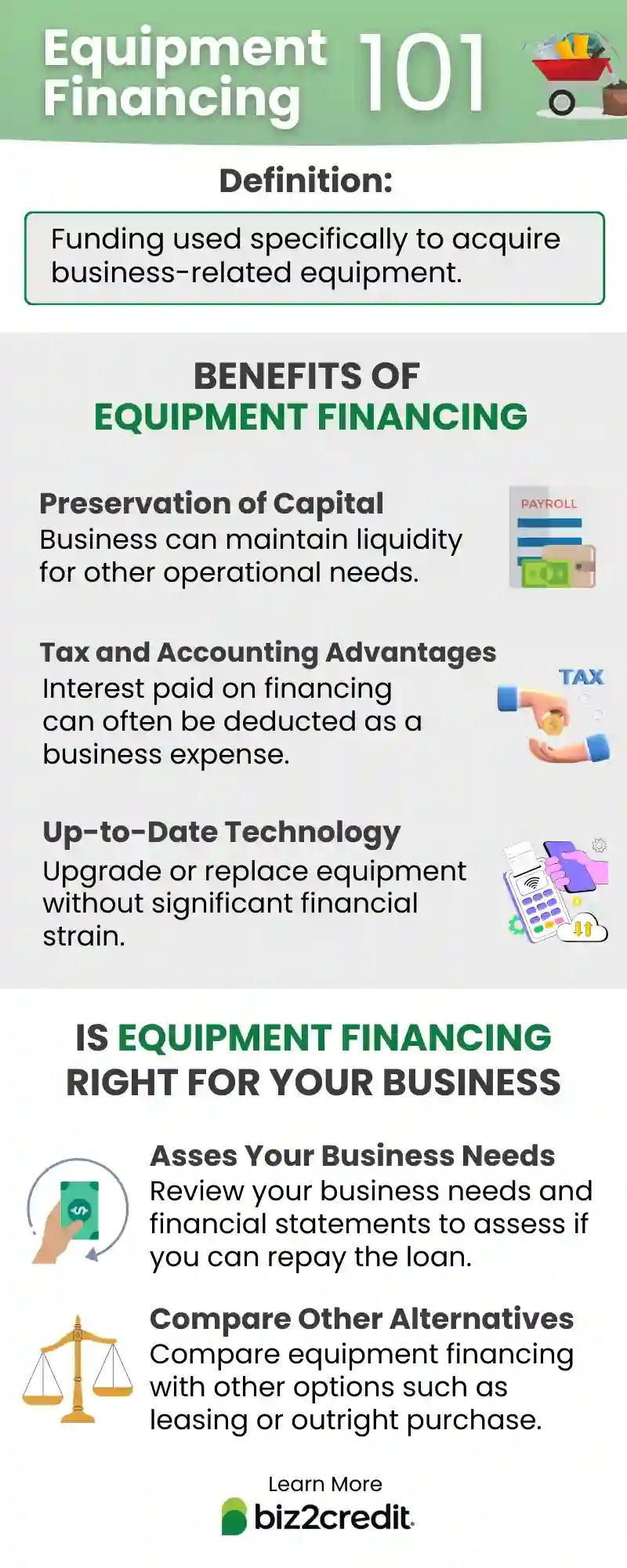What is Equipment Financing: Is It Right for Your Business?
April 14, 2025 | Last Updated on: April 14, 2025

Getting the right equipment can be a game-changer for growing a business. Unfortunately, new equipmentBenefits of Equipment Financing is often expensive, requiring a significant investment that many small businesses don’t have on hand. Equipment financing offers a way to acquire essential equipment without the hefty upfront cost.
Whether you’re a startup eyeing cutting-edge technology or an established business looking to upgrade machinery, understanding equipment financing could be the key to making informed, strategic decisions for your business’s future. This article explains equipment financing as a small business loan, what lenders need from potential borrowers during the application process, and how it fits into different business models.
Understanding Equipment Financing
Equipment financing refers to a funding used specifically to acquire business-related equipment, including things like high-end kitchen appliances for restaurants, advanced tools for trade professionals, sophisticated point-of-sale (POS) systems for retailers, state-of-the-art medical equipment for healthcare providers, or new vehicles for transportation companies. This type of financing allows businesses to spread out the cost of expensive equipment over time, making it more manageable.
How Equipment Financing Works
The process typically involves selecting the required equipment and then approaching a lender who pays for this equipment upfront. The business then repays this amount over a set period, with interest. The equipment itself serves as the main collateral for the financing, which can sometimes lead to more favorable terms compared to unsecured loans. Common terms and conditions include the financing amount, interest rate, repayment schedule, and any potential penalties for early repayment.
The underwriting for a loan on a piece of equipment can take several businesses as the lender (such as a traditional bank or credit union) needs to figure out the value of the equipment, as well as evaluate you as a borrower. The best equipment financing option will give you flexible financing, flexible terms, and several payment options to pay off the loan.
The interest you pay on the loan amount may be tax deductible, so be sure to check with a licensed tax professional. Additionally, you may be able to bring the depreciation of the equipment into your tax return as well.

Benefits of Equipment Financing
Preservation of Capital: One of the advantages of small business equipment loans is the preservation of working capital. Instead of tying up large amounts of cash, businesses can maintain liquidity for other operational needs. For example, a restaurant can use the saved funds for ingredient purchases or marketing, while a retail store can allocate funds towards payroll, inventory, or store renovations.
Flexibility and Up-to-Date Technology: Equipment financing option offers flexibility, not only in repayment terms but also in keeping up with technological advancements. Businesses can upgrade or replace equipment without significant financial strain, ensuring they always have access to the latest technology. This is vital for sectors like healthcare, where evolving medical technologies are crucial for patient care.
Ability to use different lending: If you’re looking to borrow for a piece of equipment, you don’t necessarily need to use equipment financing. You can also look into other financing solutions like a business line of credit or SBA loan. Whichever route you choose, be sure that your monthly payments are manageable, and that you find a loan with a competitive rate against other lenders.
Considering If Equipment Financing Is Right for Your Business
Assessing Your Business Needs and Financial Health: Before inquiring to equipment financing companies about lending, it’s crucial to assess your business’s specific needs and financial situation. Consider the type of equipment needed and how it will contribute to your business operations. For instance, a construction company might assess the long-term utility of heavy machinery, while an insurance agency might consider the benefits of upgrading its data processing systems. Also, review your financial statements and cash flow projections to determine if you can comfortably meet the repayment terms.
Don Saunders, owner of Saunders Landscape Supply, faced a cash flow crunch and needed financing to upgrade his equipment.
Comparing Alternatives: Compare equipment financing with other options such as leasing or outright purchase. While financing may be ideal for acquiring long-term assets, leasing could be more suitable for equipment that quickly becomes obsolete. Purchasing might be preferable if you have sufficient capital and the equipment has a long usable life.
Final Thoughts
Equipment financing can be an excellent tool for businesses looking to expand or modernize their operations without the immediate financial burden of outright purchases. Whether it’s a restaurant upgrading its kitchen, a retail store revamping its checkout area, or a professional office investing in the latest industry technology, equipment financing option offers a practical solution.
If you need equipment for a shorter amount of time and don’t want to deal with the headache of ownership, you may consider equipment leasing as an option.
It’s crucial to weigh this option against your business needs and your overall balance sheet. Also consider the purchase price of the equipment and if you’re able to get the equipment at a better price. Consulting with financial experts can provide additional insights tailored to your specific business context.
FAQs about Equipment Financing
What are typical terms for equipment financing?
Typical equipment financing terms range from 12 to 72 months. Interest rates vary from 4% to 20% depending on creditworthiness and the type of equipment. However, these loans likely require a down payment by the borrower.
What is an equipment finance loan?
An equipment financing loan is a type of loan specifically used to purchase business-related equipment, such as machinery, vehicles, or technology. The business equipment is typically the loan collateral, and the loan is paid over time.
How long is an equipment loan?
An equipment loan can range in length. It depends on the price of the equipment and the loan terms agreed on.
What credit score is needed for an equipment loan?
Eligibility for an equipment loan can heavily depend on credit approval. Each lender will have various requirements when it comes to credit score.
Can I get equipment financing with bad credit?
Business owners with bad credit may be able to qualify, but could result in higher fees and interest rates on an financed equipment purchase.
Frequent searches leading to this page
business equipment financing, what is equipment finance




